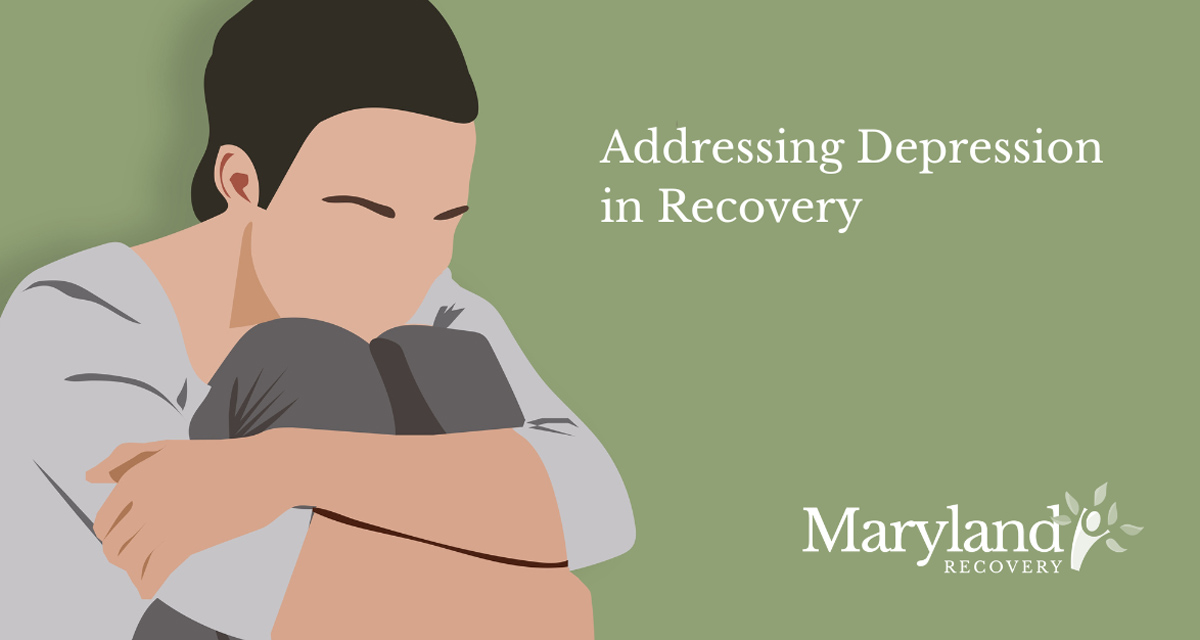
Depression and substance use disorder are two different mental health conditions that often occur together. If you’re like many people, you may have begun using substances as a means of coping with the symptoms of depression – in fact, research published in the Journal of Clinical Psychiatry (Turner, et. al., 2018) states that nearly 25% of people with a mental health disorder admit to self-medicating with substances. That’s because substance use can suppress feelings of depression for a time, providing a sense of temporary relief. Unfortunately, however, substance use eventually exacerbates symptoms of depression.
If you or a loved one is struggling with depression and substance use disorder together, learning more about how the two conditions affect one another can be key to finding recovery.
The Hidden Truth About Depression in Sobriety
Depression is very common during active substance use as well as in the beginning stages of recovery. While you may have expected to feel better right away once you eliminate your substance of choice, as with most aspects of sobriety, emotional healing is a process. An important part of this healing involves emotional sobriety – developing the emotional intelligence and healthy coping skills you need to address the mental health challenges that may have triggered substance use disorder (SUD) as well as the SUD itself. Emotional sobriety takes time to develop.
Some people also experience Post-Acute Withdrawal Syndrome (PAWS) immediately after entering sobriety. PAWS consists of a set of both physical and mental withdrawal-type symptoms experienced weeks or even months after using substances. PAWS can impact a person’s emotional state and cause depression, anxiety, vulnerability, sleep disturbances, confusion, memory loss, loss of concentration, and more..
Lingering depression is also common after substance use has stopped, even if other symptoms of PAWS are not present. Prolonged substance use can alter neurological pathways and disrupt brain chemistry. Even after detox, both must readjust over time to re-establish normal brain processes.
As mentioned, many people experience one or more mental health disorders and substance use disorder (SUD) at the same time, otherwise known as a co-occurring disorder, or a dual diagnosis. To find long-lasting recovery from both disorders, they must be treated simultaneously. For example, if you do not address the root causes of your feelings of depression, you may be more likely to experience a relapse after a period of sobriety. If you or a loved one is struggling with depression in addiction recovery, consider a dual diagnosis rehab program, such as Maryland Recovery’s dual diagnosis program.
Why Depression Often Shows Up After You Get Clean
If you have recently started your recovery journey but are still feeling sad and hopeless, know that you are not alone. There are many reasons depression may occur after detoxing.
Depression Was Masked By SUD
One cause of depression appearing after a detox is that the substance use was masking mental health symptoms. Substances are frequently used to numb pain or help a person cope with difficult emotions and traumatic events. When substances are removed, people may feel flat, without motivation, or unable to enjoy things that were once pleasurable.
A person may not have been aware that they were suffering from a mental health illness before their substance use and have only discovered their symptoms after detoxing.
“Rebound” Depression
When substance use ceases, it takes time for the brain’s chemistry to stabilize. According to the National Institute on Drug Abuse, the brain has been re-wired to experience pleasure from substance use; therefore, the cravings for the substance and the feelings it causes continue long after the substance is removed (NIDA, 2020). The longer a person gives in to these cravings, the more tolerance is built, and the brain can have trouble returning to normal function and experiencing enjoyment without the substance.
Return of Emotions
Many people turn to substances during difficult times in life, specifically to avoid experiencing negative emotions. Losing this method of coping – while unhealthy – can result in raw emotions coming to the surface. This is especially true when emotional turmoil has not been adequately addressed with dual diagnosis treatment. These feelings of depression will likely intensify the longer it is left untreated.
Is This Depression or Just a Low Phase in Recovery?

It is important to note that mood swings are another normal part of the early recovery process as the brain learns how to function without substances. Mood swings are usually temporary, and mood should regulate over time as the emotional circuitry of the brain heals. However, not all periods of “feeling low” can be attributed to mood swings.
Clinical Depression
Clinical depression consists of depression symptoms that are more than natural fluctuations in your moods. According to the World Health Organization (WHO), depression is an extremely common mental health disorder (WHO, 2025) that consists of at least one depressive episode in which individuals may feel hopelessness, sadness, or anger.
Other symptoms include:
- Difficulty concentrating
- Extreme guilt or low self-esteem
- Suicidal ideation
- Insomnia
- Weight gain or loss
- Decreased levels of energy
Emotional Instability
Emotional instability is defined as a condition characterized by consistent mood fluctuations. These mood swings may be severe and can be experienced quickly and unexpectedly. A person struggling with emotional instability is not able to easily regulate their emotions, and the intensity of their emotions often negatively impacts every aspect of their life.
Rather than trying to self-diagnose with either depression or emotional instability, it is important to seek help from mental health professionals who can give a real diagnosis and the tools for beginning your recovery.
How Depression Affects Relapse Risk
As depression and addiction often overlap, it is not surprising that relapse and depression often overlap as well. During detox, the symptoms of withdrawal may feel similar to symptoms of depression. Emotional struggles in recovery can also be overwhelming and frightening, reinforcing a powerful urge to revert to unhealthy habits.
Without a structured schedule and healthy coping skills, it can seem easier to fall back into substance use and other unhealthy lifestyle choices. If you do not have a solid support system, it is even easier to return to self-medication, as there is no one to hold you accountable. Staying sober with depression is difficult, but not impossible. Identifying depression early on in your recovery journey is key to achieving long-term success.
Healthy Ways to Cope with Depression in Recovery

Developing healthy coping skills to handle depression is imperative for long-term recovery. Here are a few strategies to implement regarding how to deal with depression after getting sober:
Keep a Consistent Schedule
Returning to substance use can often result from a lack of structure. Creating a daily routine or even a slate of weekly tasks to complete gives you something to achieve every day. This is especially helpful early in your recovery as you try to adapt to a new way of life, which can be overwhelming without a plan in place. Having a consistent schedule to follow helps you to start to feel a sense of normalcy, which is crucial to a successful recovery.
Therapy and Peer Support
The encouragement and support of loved ones is extremely beneficial in helping you stay in recovery. Surround yourself with others who have overcome similar struggles, as well as people who are supportive of your recovery. As one study noted in Society for the Study of Addiction (Moos et. al., 2006), those who depend on others to help them remain sober are much less likely to relapse. Therapy can also be beneficial in helping people sort through complex emotions or issues.
Explore Holistic Methods
A holistic approach to substance abuse programs typically involves a variety of therapies that are designed to meet the unique needs of each individual with SUD. Regardless of the type of holistic method you choose, the goal is to treat the whole person by addressing the body, mind, and spirit.
For example, a holistic healing approach may focus on healing the mind and body simultaneously through therapies such as mindfulness and meditation, massage therapy, and energy healing practices. Other treatments involve physical activity, improved nutrition, dietary supplements, or herbal medicines in addition to individual and group therapy and psychiatric treatment.
At Maryland Recovery, we offer holistic programs featuring several kinds of therapy, all designed to meet the social and behavioral needs of our clients. Options include various therapeutic exercises, such as yoga, art therapy, and acupuncture.
Limiting Isolation and Negative Self-Talk
As noted above, relapse is less likely to occur when you have the support of friends and family. Even though it can be tempting to hide from others due to feelings of shame, it is important not to give in to those feelings. Negative self-talk is another hindrance to healing, as it further isolates you and may even help to convince you that you are not worthy of recovery or a healthy life.
Preventing relapse is possible with hard work and support, but even the most disciplined person can still experience setbacks. It’s important to remember that setbacks do not mean you’re a failure or that you will never recover. Don’t expect perfection, which will set you up to fail, but instead, work towards progress in the form of small victories every day.
When Professional Help Is Needed
If you have been struggling with symptoms of depression for at least two weeks, it is wise to seek professional help – especially if you also have a substance use disorder. Depression can increase in severity and become more dangerous as time goes on, potentially leading to self-harm, suicidal ideation, or even suicidal attempts. Please note: any suicidal thoughts or plans to self-harm require immediate attention.
At Maryland Recovery, we are here to walk you through your addiction recovery and mental health issues. Our treatment team includes certified counselors, life coaches, and board-certified psychiatrists to help you on your road to recovery.
If you decide you need help from a medical professional, be assured that this does not make you a failure. Instead, it is the first action step in the healing process.
How Maryland Recovery Helps with Depression in Addiction Recovery

For over two decades, Maryland Recovery has been advocating for individuals seeking to transform their lives through a holistic approach to treatment. If you’re looking for a way to stay in recovery while dealing with depression, consider individualized addiction treatment with sober living.
We also offer SUD and mental health disorders using structured, individual, and group therapy, as well as long-term support after detox and trauma-informed care that is tailored to fit your needs. Although we are not a psychiatric facility, our dual diagnosis outpatient program provides you with the tools you need to achieve long-lasting recovery. Even if you have not been diagnosed with depression, you can still qualify for our programs, as a diagnosis is not needed for admission.
Healing Takes Time: It’s Possible
Feeling stuck in hopelessness and sadness while struggling to remain sober is an extremely lonely and painful experience. Be encouraged – you do not need to handle substance use disorders and mental health issues alone.
If you or someone you love is mired in substance use and depression, there is still hope. Contact Maryland Recovery to learn more and request guidance regarding our programs.
Editor’s Note: This article was originally published May 7, 2018 and has been updated October 6, 2025.
Sources:
- University of North Carolina School of Medicine. (2021, July 9). UNC study ties ending moderate drinking to depression. https://www.med.unc.edu/alcohol/news-events/unc-study-ties-ending-moderate-drinking-to-depression/
- Cleveland Clinic. (2022, October 20). What is emotional sobriety? https://health.clevelandclinic.org/what-is-emotional-sobriety
- World Health Organization. (2023, September 13). Depression. https://www.who.int/news-room/fact-sheets/detail/depression
- Dell’Osso, B., & Lader, M. (2013). Do benzodiazepines still deserve a major role in the treatment of psychiatric disorders? A critical reappraisal. Journal of Psychopathology, 19(4), 216–224. https://www.jpsychopathol.it/article/view/453
- Jacobson, N. C., & Newman, M. G. (2017). Anxiety and depression as bidirectional risk factors for one another: A meta-analysis of longitudinal studies. Depression and Anxiety, 34(9), 831–845. https://doi.org/10.1002/da.22771
- Dawson, D. A., Grant, B. F., Stinson, F. S., & Chou, P. S. (2006). Estimating the effect of help-seeking on achieving recovery from alcohol dependence. Addiction, 101(6), 824–834. https://doi.org/10.1111/j.1360-0443.2006.01310.x
- National Institute of Mental Health. (n.d.). Depression. Retrieved March 27, 2025, from https://www.nimh.nih.gov/health/publications/depression#:~:text=Persistent%20sad%2C%20anxious%2C%20or%20%E2%80%9C,symptoms%2C%20while%20others%20experience%20many

A solution focused therapist with over a decade in the helping services, I am attuned to the broad expanse of holistic recovery. My mission is inspired by the work of Joseph Campbell, Dr. Wayne Dyer, and Fr. Joseph Martin. I am well versed in the specific needs of the recovery community and am trained in EMDR.








